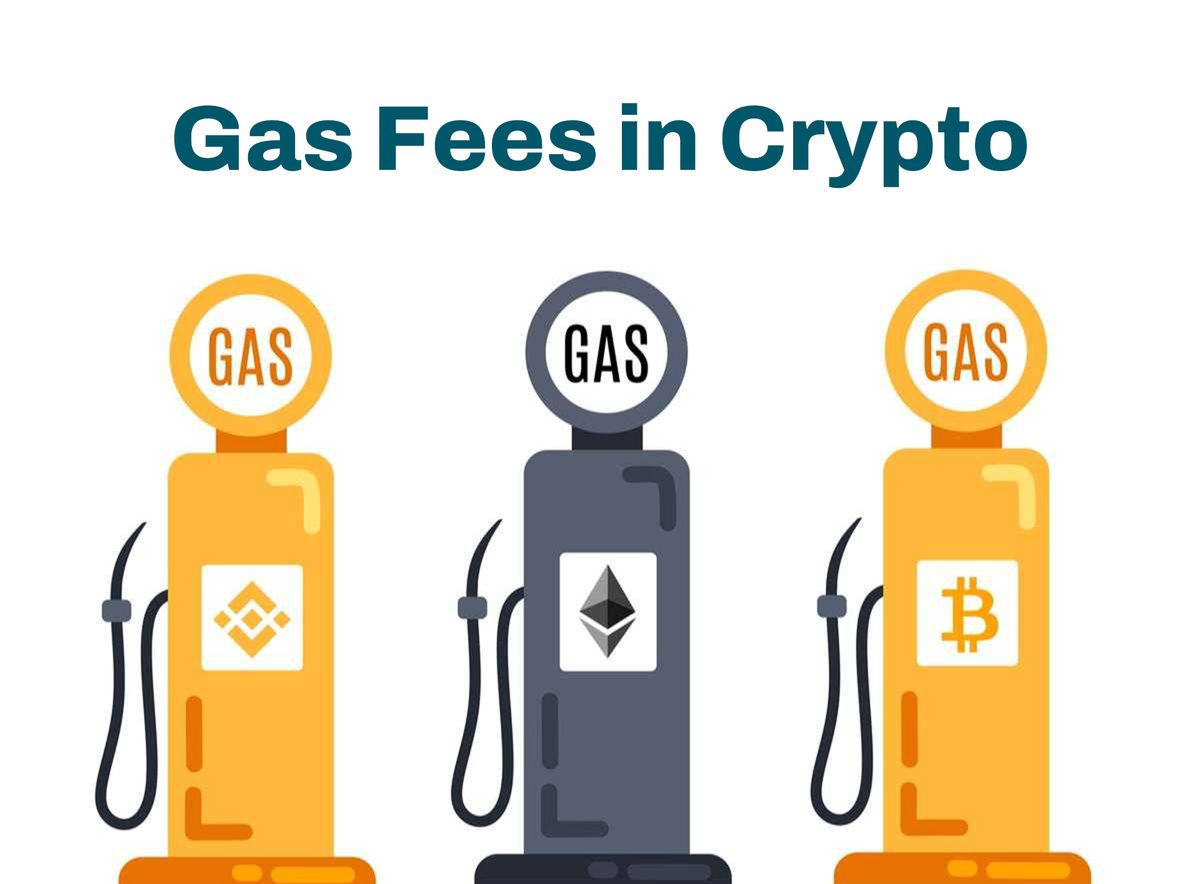What Are Gas Fees in Crypto?
A gas fee is the cost of performing transactions or actions on the Ethereum blockchain.

Table of Contents
- What Are Gas Fees in Crypto?
- How Do Gas Fees Work?
- Why Are Gas Fees Necessary?
- How Is the Gas Fee Calculated?
- Why Are Gas Fees Often So High?
- Ethereum Gas Fees vs. Bitcoin Transaction/Miner Fees
- FAQs
Gas fees are an important part of cryptocurrency and blockchain operations.
Think of gas as the fuel or energy required for the Ethereum network to process and validate transactions or smart contracts. Like a car needs fuel to run, the Ethereum network relies on gas to operate smoothly.
In this article, we break down how gas fees work and how to calculate gas fees for your transactions.
What Are Gas Fees in Crypto?
A gas fee is the cost of performing transactions or actions like minting/creating an NFT on the Ethereum blockchain.
Other cryptocurrencies may call gas fees 'transaction fees', 'miner fees', or something similar.
However, since Ethereum is currently the second-largest crypto by market cap, the term "gas" is often applied when referring to the fees involved in using other blockchains.
The gas fee you pay is determined by two factors:
- The amount of computational work your transaction requires and the current market price of gas. Gas fees are typically measured in a unit called "Gwei" (short for gigawei).
- The total cost is calculated by multiplying the gas price (in Gwei) with the amount of gas used.
Gas fees can vary greatly depending on network demand and congestion. They can increase significantly during periods of high activity, such as when many people are trading ETH or using decentralised applications (DApps).
It's important to consider gas fees when transacting on the Ethereum network to ensure you include an appropriate fee for timely processing.
Various websites and tools track gas prices on the Ethereum network to help users stay informed. These websites show the current gas prices in Gwei and can help you estimate the appropriate fees to include with your transactions.
Websites like Blocknative and Etherscan provide real-time updates on gas prices, allowing you to make informed decisions when setting their transaction fees.
How Do Gas Fees Work?
Gas fees are important in processing and recording transactions on blockchain networks like Ethereum.
Let's break down how gas fees work:
1. Understanding Gas: Gas is a unit of measurement representing the computational work required to carry out actions on the Ethereum network. Each activity on the Ethereum blockchain, such as making a transaction or executing a smart contract, consumes a certain amount of gas.
2. Gas Price: Gas is measured in a small unit called Gwei (short for gigawei). Users need to specify the gas price they are willing to pay for each unit of gas consumed. This price is usually set in Ether (ETH), Ethereum's native cryptocurrency.
3. Transaction and Gas Limit: When initiating a transaction or running a smart contract, users set a gas limit, which is the maximum amount of gas they are willing to pay for that operation. This limit protects users from unintentionally spending excessive amounts of gas.
4. Calculating Gas Fees: To calculate the gas fee for a transaction, you multiply the gas used by the gas price. For example, if 300,000 gas units were consumed and the gas price was set at 10 Gwei per gas, the total gas fee would be 100,000 gas * 10 Gwei = 3,000,000 Gwei (or 0.001 ETH).
5. Supply and Demand: Gas fees are determined by supply and demand. When there is high demand for block space and limited supply (limited block size and computational resources), users often need to bid higher gas fees to ensure their transactions are processed promptly.
Why Are Gas Fees Necessary?
Gas fees are important in blockchain networks like Ethereum for several reasons:
1. Incentivising Miners: Gas fees serve as incentives for miners to include and validate transactions on the blockchain. Miners invest computational power, time, and resources to maintain the network's security and integrity. The fees they receive motivate them to continue participating in the network and secure it against malicious activities.
2. Network Security: By requiring gas fees, blockchain networks hinder potential attackers from flooding the network with spam or frivolous transactions. The cost associated with gas fees provides a barrier against such attacks and helps maintain the network's stability and security.
3. Resource Allocation: Gas fees help share limited resources efficiently. Since block space in the blockchain is limited, users compete for space by offering higher gas fees for their transactions. This arrangement ensures that the most valuable and prioritised transactions get processed first and prevents network congestion.
4. Economic Efficiency: Gas fees are economically efficient because they require users to consider the computational effort and resources required for their transactions. Higher-demand transactions naturally command higher fees, encouraging users to optimise their operations and prioritise high-value transactions.
5. Decentralisation: Gas fees play a crucial role in maintaining the decentralised nature of blockchain networks. By compensating miners for their work it promotes a distributed network of nodes that collectively validate and secure the blockchain. This decentralisation helps prevent a single entity from gaining control or exerting undue influence over the network.
How Is the Gas Fee Calculated?
The gas fee is calculated using the Gas Limit multiplied by the Gas Price per Unit.
So if the gas limit was 30,000 and the price per unit was 300 gwei, the calculation would be 30,000 x 300 = 9,000,000 gwei or 0.009 ETH.
Why Are Gas Fees Often So High?
Gas fees in Ethereum can be high due to a combination of factors:
1. Network Congestion: Ethereum is one of the most popular used blockchains, and when there is a high volume of transactions, the blocks can become full. As more demand for block space exceeds the available capacity, gas fees increase with each rise in demand. During busy network times, users may need to offer miners higher fees (gas prices) to have their transactions prioritised and executed promptly.
2. Increasing Popularity: Ethereum's flexibility and functionality have made it a popular choice for developers and users alike. As more developers use the Ethereum network to build decentralised applications (dApps), gas fees may increase due to the higher demand for computational resources and block space.
3. Transaction Complexity: The complexity of a transaction can impact the gas fee. Simple ETH transfers involve minimal data and are relatively inexpensive. However, executing complex operations like smart contracts, which involve recording, storing, and managing large amounts of data, can require more gas and result in higher fees.
4. Historical Peaks: In the past, during periods of significant market activity, such as the 2017 ICO boom and the DeFi summer of 2020, the Ethereum network experienced congestion and spikes in gas fees. These periods of intense growth and increased usage strain the network, causing fees to reach extremely high levels.
It's important to note that gas fees in Ethereum are not always significantly high, and they fluctuate based on network demand and congestion.
Ethereum Gas Fees vs. Bitcoin Transaction/Miner Fees
Ethereum and Bitcoin have fees associated with their transactions, but how these fees are calculated and used slightly differs.
As we mentioned before, Ethereum's fee is called a "gas fee." Gas fees measure the computational effort needed to make a transaction or execute a smart contract on the Ethereum blockchain.
On the other hand, in Bitcoin, fees are often referred to as "transaction fees" or "miner fees." Bitcoin uses the proof-of-work model, where miners use powerful computers to solve complex math problems.
When miners successfully solve problems, they're rewarded with new Bitcoins. Transaction fees in Bitcoin are paid to encourage miners to include your transaction in a block and prioritise it over other transactions.
In essence:
- Ethereum gas fees are paid for the computational effort needed to execute operations on the Ethereum network.
- Bitcoin transaction fees are paid to encourage miners to include your transaction in a block and confirm its validity.
To Round Up
Gas fees play a vital role in creating a sustainable and secure ecosystem for blockchain transactions.
It's important to consider gas fees when transacting on the Ethereum network to ensure you include an appropriate fee that ensures the timely processing of your transactions.
By paying gas fees, you contribute to the security and decentralisation of the Ethereum network, as they encourage miners to validate transactions and secure the blockchain.
FAQs
Q1: When are gas fees lowest?
A1: Gas fees are lowest during periods of low network activity when there are fewer transactions and smart contract executions on the Ethereum network.
Q2: Why is my gas fee so high?
A2: Your gas fee may be high due to network congestion, increased demand for computational resources, transaction complexity, and historical peaks in network activity. During busy times, users may need to offer miners higher fees to prioritize their transactions.
Q3: How can I avoid gas fees?
A3: You can't entirely avoid gas fees, but you can minimise them by transacting during less congested times, keeping your transactions simple, and setting reasonable gas limits and prices.
Q4: Who receives gas fees?
A4: Gas fees are received by miners. These fees serve as incentives for miners to validate transactions and secure the Ethereum network.
Q5: Where do gas fees go?
A5: Gas fees are distributed to miners, helping maintain the Ethereum network's decentralised nature.
Q6: What is Ethereum's Gas Fee Now?
A6: To find the current Ethereum gas fee, check real-time sources, like Blocknative and Etherscan, as gas fees can change frequently.
Q7: Why do I have to pay a gas fee?
A7: You pay a gas fee to cover the costs of processing your Ethereum transactions and smart contracts, incentivizing miners to secure the network.
Q8: Why are gas fees expensive?
A8: Gas fees can be expensive during busy periods due to high demand for limited resources, leading users to bid higher fees for faster transaction processing.
Disclaimer: This article was written to provide guidance and understanding. It is not an exhaustive article and should not be taken as financial advice. Obiex will not be held liable for your investment decisions.

